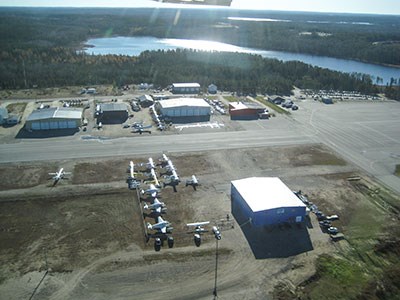One of the North’s most extensive and meaningful social enterprise ventures will finally take off next year with the construction of a First Nations regional food distribution centre in Sioux Lookout.
Town economic development manager Vicki Blanchard said discussions are underway with Aboriginal Affairs and Northern Development Canada toward selecting a candidate to write the business plan for the proposed network, to supply 16 remote communities with affordable and fresh food.
A request for proposals has been released toward selecting a contractor who will run the logistics and warehousing operation out of a new 11,875-square-foot distribution centre to be built this fall at the airport. Operations start next spring.
A non-profit logistics corporation will be tasked with coordinating volumes of freight to ensure perishable food and other goods get to the isolated communities in a timely fashion.
Blanchard said talks with Aboriginal Affairs and other government funding agencies are ongoing to finance the $2.5-million initiative.
The network’s initial working group involved the Municipality of Sioux Lookout, CreeWest General Partnership and the communities of Lac Seul and Kitchenuhmaykoosib First Nations, though more public and private sector partners are likely to come aboard.
“We plan to bring all the chiefs into Sioux Lookout this summer and the process will be kicked off with a meeting with all the private sector and community partners,” said Blanchard.
The list of invitees includes companies and organizations like Wal-Mart, Sysco, Cloverbelt Local Food Co-op and Manitoulin Transport.
Blanchard said she’s been contacted by a number of air carriers and other trucking companies about getting involved.
“We’re encouraging all companies to participate in the development of the operational plan. Their knowledge is important to us.”
After the signing of a memorandum of understanding last December to establish a food distribution corporation, it was initially thought the operation would start by fall.
But Blanchard maintains things are not slowing down.
“We are making great headway because we now have Aboriginal Affairs as a partner,” she said.
“It is a labour of love and people are working hard with us. We have not lost momentum.”
After last December’s signing ceremony, CreeWest GP CEO Ron Basaraba said if government can regulate beer prices to ensure they are the same across the province, subsidies should be available for supply nutritious food to Northern communities.
Blanchard agrees.
“The bottom line here is: if food leaves here at a buck it should land at a buck. Then we wouldn’t have a problem. We’re trying to get the food into the communities at a fair rate.”
Blanchard said grocery stores in the remote communities have been subsidized for years through the federal Nutrition North food program, but consumers aren’t seeing the benefits.
Blanchard said they’ll continue to work with Aboriginal Affairs to come up with a formula for subsidizing freight to these communities.
It will be up to the individual communities to source their own food, negotiate the pricing and buy in bulk.
The role of the Regional Distribution Centre – Northern Logistics will strictly be warehousing and the movement of goods.
The building, which will have airside access, will contain a walk-in freezer and commercial stacking shelves for perishable food and other goods.
In working with Wal-Mart and other providers, Blanchard said, “if they know everything’s being shipped to one location, they can offer better terms.”
Having a single point of distribution will better facilitate the movement of food, goods and essential services, she said.
“We’re just making sure that you’re getting a full payload off the ground. If everybody is ordering through all different points and it’s sitting on the tarmac for two weeks waiting for a plane to come, and it’s perishing, it doesn’t work.”




